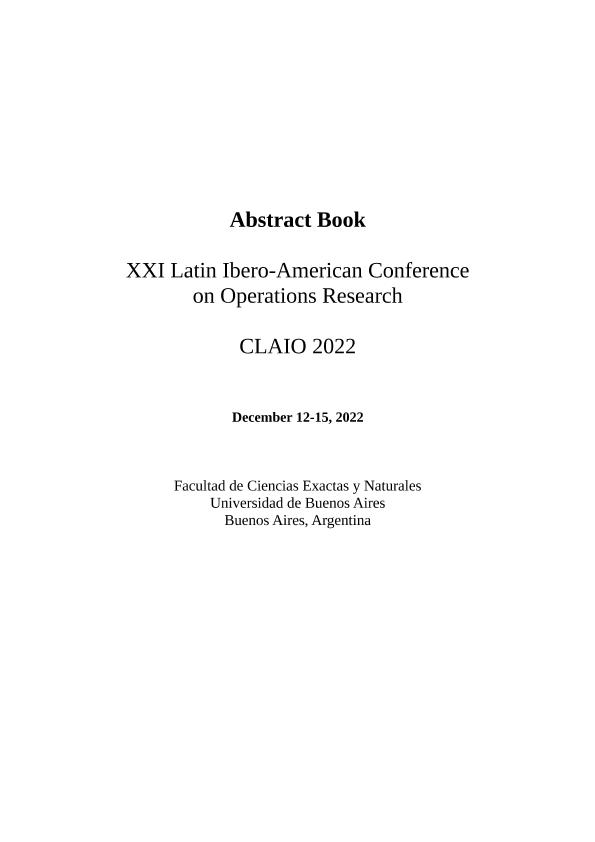Mostrar el registro sencillo del ítem
dc.contributor.author
Rossit, Daniel Alejandro

dc.contributor.author
Broz, Diego Ricardo

dc.contributor.author
Pais, Cristóbal
dc.contributor.author
Weintraub, Andrés
dc.date.available
2023-05-17T18:45:33Z
dc.date.issued
2022
dc.identifier.citation
Forestry harvest planning considering social impacts and soil compaction issues; XXI Latin Ibero-American Conference on Operations Research -CLAIO 2022; Buenos Aires; Argentina; 2022; 30-30
dc.identifier.uri
http://hdl.handle.net/11336/197881
dc.description.abstract
Forest harvest planning implies great challenges for wood supply companies. This type of planning involves complex decision processes involving different stakeholders, as well as factors outside the stakeholders that directly affect the resolution of the problem. Within these factors that affect, one of special interest is the conditioning by risk of soil compaction. This factor can be decisive in planning since it functions as a restriction or prohibition on harvesting operations. This phenomenon depends on the hydrological balances of the soils, which in turn depends on the meteorological and climatic conditions. That is why to properly address these decision processes, stochastic approaches are required. On the other hand, there exists a large number of SMEs and micro-SMEs that are dedicated to forest harvesting operations, which work as contractors for industries and provide. These companies have a direct interference in the industrial matrix and in the labor offer in the regional economy of the Argentine Northwest. However, a purely utilitarian approach to forest harvesting would tend to prioritize the hiring of larger companies with superior technical capacity, which would allow production costs to be reduced. However, this would impede the possibility of growth of the regional economy, leaving out smaller companies, which do not have the resources for technological migration. This issue has gained relevance after United Nations included this topic in its Sustainable Development Goals agenda (ODS 8).To contribute to this line, an approach based on mathematical programming is proposed that allow addressing the stochastic complexity of the problem (due to the risk of soil compaction), but that balance the workload delivered to each contractor, ensuring compliance with the demand. For this, a goal programming model is developed, which contemplates the minimization of costs and the balancing of the workload among contractors.
dc.format
application/pdf
dc.language.iso
eng
dc.publisher
Universidad de Buenos Aires. Facultad de Ciencias Exactas y Naturales
dc.rights
info:eu-repo/semantics/openAccess
dc.rights.uri
https://creativecommons.org/licenses/by-nc-sa/2.5/ar/
dc.subject
FOREST HAVESTING PLANNING
dc.subject
SUSTAINABILITY
dc.subject
SOIL COMPACTION
dc.subject
SOCIAL IMPACT
dc.subject
REGIONAL ECONOMIES
dc.subject.classification
Otras Ingenierías y Tecnologías

dc.subject.classification
Otras Ingenierías y Tecnologías

dc.subject.classification
INGENIERÍAS Y TECNOLOGÍAS

dc.title
Forestry harvest planning considering social impacts and soil compaction issues
dc.type
info:eu-repo/semantics/publishedVersion
dc.type
info:eu-repo/semantics/conferenceObject
dc.type
info:ar-repo/semantics/documento de conferencia
dc.date.updated
2023-05-10T15:31:41Z
dc.journal.pagination
30-30
dc.journal.pais
Argentina

dc.journal.ciudad
Buenos Aires
dc.description.fil
Fil: Rossit, Daniel Alejandro. Consejo Nacional de Investigaciones Científicas y Técnicas. Centro Científico Tecnológico Conicet - Bahía Blanca. Instituto de Matemática Bahía Blanca. Universidad Nacional del Sur. Departamento de Matemática. Instituto de Matemática Bahía Blanca; Argentina. Universidad Nacional del Sur. Departamento de Ingeniería; Argentina
dc.description.fil
Fil: Broz, Diego Ricardo. Consejo Nacional de Investigaciones Científicas y Técnicas; Argentina. Universidad Nacional de Misiones. Facultad de Ciencias Forestales; Argentina
dc.description.fil
Fil: Pais, Cristóbal. University of California at Berkeley; Estados Unidos
dc.description.fil
Fil: Weintraub, Andrés. Universidad de Chile.; Chile
dc.relation.alternativeid
info:eu-repo/semantics/altIdentifier/url/https://claio2022.dc.uba.ar/docs/abstract-book.pdf
dc.conicet.rol
Autor

dc.conicet.rol
Autor

dc.conicet.rol
Autor

dc.conicet.rol
Autor

dc.coverage
Internacional
dc.type.subtype
Congreso
dc.description.nombreEvento
XXI Latin Ibero-American Conference on Operations Research -CLAIO 2022
dc.date.evento
2022-12-12
dc.description.ciudadEvento
Buenos Aires
dc.description.paisEvento
Argentina

dc.type.publicacion
Book
dc.description.institucionOrganizadora
Universidad de Buenos Aires. Facultad de Ciencias Exactas y Naturales
dc.source.libro
Abstract Book: XXI Latin Ibero-American Conference on Operations Research -CLAIO 2022
dc.date.eventoHasta
2022-12-15
dc.type
Congreso
Archivos asociados
